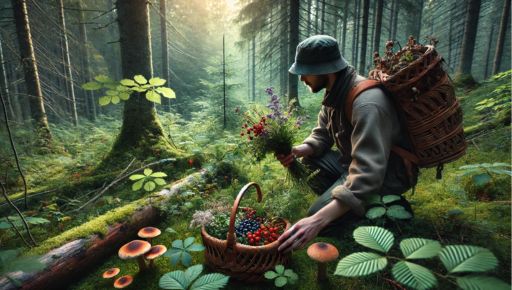Why Is Foraging Important in Bushcraft and Survival Situations?

Introduction
In the world of bushcraft and survival, the ability to forage for food and resources is a crucial skill that can mean the difference between life and death in a survival situation. Foraging involves searching for wild edible plants, fruits, nuts, and other resources that can sustain you when traditional food sources are not available. In this article, we will explore why foraging is so important in bushcraft and survival situations, and how it can enhance your chances of survival in the wild.
The Importance of Foraging in Bushcraft and Survival
Foraging is an essential skill in bushcraft and survival for several key reasons.
1. Diversification of Food Sources
When you are in a survival situation, you may not have access to traditional food sources such as stores or hunting grounds. Foraging allows you to diversify your food sources by finding edible plants and resources in the wild. This can help prevent malnutrition and keep you nourished while you wait for rescue.
2. Medicinal Plants
In addition to food, foraging can also help you find medicinal plants that have healing properties. Many wild plants have medicinal qualities that can help treat injuries, illnesses, and other health issues in a survival situation. Knowing how to identify these plants can be lifesaving when medical help is not available.
3. Resource Acquisition
Foraging is not just about finding food and medicine – it also involves gathering resources that can help you survive in the wild. This can include materials for shelter, fire-starting, tool-making, and more. By foraging for these resources, you can increase your chances of staying safe and comfortable while awaiting rescue.
How to Safely Forage in Bushcraft and Survival Situations
While foraging can be a valuable skill, it is essential to do so safely and responsibly in a survival situation.
1. Proper Identification
One of the most critical aspects of foraging is proper plant identification. Some wild plants are edible and safe to consume, while others can be toxic or harmful. It is essential to educate yourself on the local flora and fauna before attempting to forage for food and resources.
2. Ethical Foraging
When foraging in the wild, it is crucial to practice ethical foraging techniques. This includes only taking what you need, leaving no trace behind, and respecting the natural environment. By practicing ethical foraging, you can ensure that the ecosystem remains healthy and sustainable for future generations.
3. Safety Precautions
Before heading out to forage in a survival situation, make sure to take necessary safety precautions. This includes wearing appropriate clothing, carrying essential supplies, and letting someone know your plans and expected return time. Safety should always be a top priority when foraging in the wild.
Conclusion
In conclusion, foraging is a vital skill in bushcraft and survival that can greatly enhance your chances of staying alive and well in the wilderness. By learning how to identify edible plants, medicinal resources, and other valuable resources in the wild, you can increase your likelihood of survival in challenging situations. Remember to forage responsibly, practice proper safety precautions, and always respect the natural environment when engaging in foraging activities.
